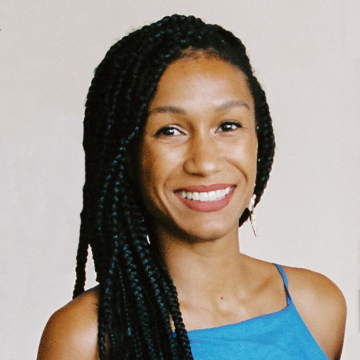What is Giving Compass?
We connect donors to learning resources and ways to support community-led solutions. Learn more about us.
This Q&A is part of a series highlighting the 2022 Black Women Give List honorees.
 Nicole Cardoza wants to build a future for everyone … and she wants you to join her.
Nicole Cardoza wants to build a future for everyone … and she wants you to join her.
Founder and CEO of Reclamation Ventures, Cardoza also owns Anti-Racism Daily, an independent publication supported entirely by its readers. Over the last two years, the online outlet has amassed a readership of 300,000 people.
Cardoza was recently featured in the 2022 Black Women Give List, an initiative of the Women’s Philanthropy Institute, Black Philanthropy Month and The Women Invested to Save the Earth (WISE) Fund. Building on research that demonstrates the unique perspectives women across race and ethnicity bring to philanthropy and recognizing women as leaders for racial justice issues, the list highlights the contributions Black women donors have made around the world.
Giving Compass talked with Cardoza to learn more about her work. The interview has been edited for length and clarity.
Briefly, can you describe some of your philanthropic work that you are most excited about?
I'm most excited about the grantmaking at Reclamation Ventures, which is my venture studio. We give away $50,000 quarterly in direct support to people making wellness more accessible in their communities. We focus on a specific issue and donate $5,000 to 10 people each quarter to help them support their work. It can be money that they can use personally or professionally, without restrictions.
I've also made a commitment to give away half of my wealth. Although I'm new with wealth, it's exciting to see that go through the fund and then support other mutual aid organizations and local initiatives close to where I live. I want to set an example that you can make an impact even though you’re not a multi-millionaire or you’re not affiliated with a massive fund, you don't have a DAF, or your family doesn't have a foundation. You can still be a philanthropist. I think we need to deconstruct the barriers that might make people internalize that they can't be a philanthropist and that’s what I hope to do.
How have your personal experiences as a Black woman informed your approach to philanthropy?
I've seen the model through the Black women in my life who are ruthlessly charitable to support themselves and their community. My great-grandmother used to host dinners every night at her house in South Philly; and everyone was invited, and there was always enough food. It was rooted in this idea that inherent abundance is worth sharing, even if we have a scarcity mindset in our culture. We also know throughout history, Black women have created powerful giving circles and financially-based networks to help people grow. Most of my money I give away to the Black and queer community, and that’s paying forward for what our ancestors have done, which created the space for us to physically be here today.
Can you describe how your publication, Anti-Racism Daily, is disrupting the media space? Can you describe its impact?
We prioritize action and solutions to the issues that we're experiencing every day. We raise awareness about incredible community organizers and the causes and initiatives that they support, and we encourage people to give. That's a big part of taking action. Our readers have donated an estimated $2.5 million to the causes of charities that we feature in the newsletter. I think it's a beautiful model for how we can mobilize people around the causes that matter most. You have to make tangible, direct support to change some of the barriers we have in society today.
What are you most hopeful about?
I'm most hopeful that we as a community are reclaiming our collective power to change the systems and structures that affect us. I was raised with the idea that the people with more gravitas, the people in higher positions of power who have more money, or are more educated are the ones making change. However, we’ve witnessed over the past decade and what we will continue to see in the years ahead is that a group of us can rally together and pool our funds and make it easier for our community to eat. We can effectively boycott something or unionize to be able to shift economic power toward those that need it most. That's what's most inspiring to me. We are redefining what it means to be in relationship with money and dismantling money’s relationship to power.
What advice would you give other philanthropists?
Where else can you cede power? How is your giving perpetuating power dynamics that have harmed communities of color, and what are you doing to actively dismantle that in relationship with the funds that you work with, and the organizations you support?
Release your relationship with the definition of philanthropist or [release] the entitlement and privilege that can come with the term and just do the work.